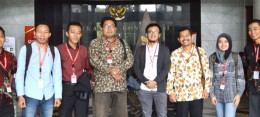
photos together the plaintiffs Judicial Review Act Plantation
Indonesian Peasant Alliance (API), together with several Institutions / Organizations undertake judicial review of Law No. 39/2014 on Plantation compared with the Constitution in 1945 for consideration by the Constitutional Court.
The Plantation Act No. 39/2014 on the revised of the Plantation Act No. 18/2004 conducted in the final seconds of duty members of the House of Representatives last period 2009-2014. The farmers’ organizations and civil society who have been carrying the issues of the plantation and the struggle for justice by way of agrarian reform in the plantation sector, suddenly shocked by the birth of this revision.
Therefore all, as soon as possible, several farmers’ organizations, civil society organizations and legal institutions that focus on agrarian reform in the plantation sector to react to the get started from the field research was then followed by the Focus Group Discussion (FGD to strengthen data analysis by comparing to the Constitution in 1945), from the FGD results, it appeared that the revision of the Plantation Act No. 39/2014 has many weaknesses, it makes several community organizations / Institutions such as SPKS, SAWIT WATCH, API, SPI, FIELD, BINA DESA and IHCS as legal counsel conduct Judicial Review and up to this time, they still continue to oversee the process of Judicial Review of the Plantation Act No. 39/2014. The trial process has lasted three times, and the third trial scheduled “Listening Description President and the Parliament” in the Meeting Room of the Constitutional Court of Indonesia, (Jakarta Tuesday, March 22, 2016).
“Farmers’ Rights Plant Breeders The Breached”
Analyzing arrangement seed in the Plantations Act with a Constitut
ional Court decision in the case of judicial review of Law Plant Cultivation System, can be seen a potential violation of the constitution.
Plantation Act stated :
Article 27
clause (3) The search and collection of genetic resources referred to in clause (2) can be done by a natural person or legal entity by permit from the Minister.
in clause (4) of the Central Government and Local Government in accordance with the authority preservation of genetic resources with the community.
In Clause (5) The procedure of search, collection, and the preservation of genetic resources will be further stipulated in Government Regulation.
Individual the word in the Article 27 paragraph clause (3), when using the opinion of the Constitutional Court in the case verdict of a judicial review of the laws Plant Cultivation System, then Plantations Act to the extent not contrary to the constitution not interpreted that permit does not apply to individual small farmers who undertake activities such as search and collection of genetic resources for themselves and their own communities.
Plantation Act is still in the green revolution outmoded paradigms as well as opening opportunities for agricultural enterprises, when looking at the farmers do not have the capability in plant breeding, as seen in Article 29 of Act Plantation:
Central Government, Local Government in accordance with the authority, or business communities Plantations can do plant breeding to find improved varieties.
Based on the verdict the Constitutional Court in the case of judicial review of Law Systems Plant Cultivation, individual farmers is supposed also be able to undertake plant breeding, as the opinion of the Constitutional Court as follows:
The potential of small farmers is very large, so that the government is obliged to protect. If the efforts of farmers who its objectives to get good varieties or a good seed, The government is obliged to provide guidance early on so that these efforts can be managed properly and not just involved in the final process, such as granting certification. Farmers face all the risks on the efforts carried out both failure and success. Thus the government must be active to help farmers who are trying to find a good variety and is not limited to planning at the time want to remove it.
Because hereditary farmers undertake plant breeding, began to from search for genetic resources, producing seeds craving and distribute it among the farmers themselves, then it is not supposed to the distribution of creative works for the community farmers must be through the release by the Government. Plantation Act regulates the release of seed with not exclude individual small farmers.
Article 30, clause (1) Variety the result of breeding or introduced from oversea prior to distribution must first be removed by the Central Government or launched by the owners of varieties.
Release of seed that must first be released Central Government as set out in Article 30 on Act Plantation, use the opinion of the Constitutional Court in the case verdict judicial review of the laws Plant Cultivation System, then word first released by the Central Government, contrary to the constitution, contrary to the constitution, to the extent not mean that the provision does not apply to the results of plant breeding is done by individual small farmers in the country for their own community.
Eliminating farmers the cultivation tradition that has lasted hereditary constitutes an infringement of the right to life and the right to sustain life under Article 28A of the 1945 Constitution: “Everyone has the right to live and to defend life and livelihood.”

Comments are closed